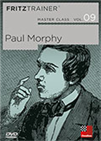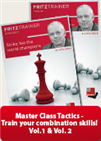Ever since Magnus Carlsen first suggested GM Dlugy was somehow linked to the cheating accusations he had already made against Hans Niemann, the American grandmaster had refused to speak to the media on the subject. Then he released the statement a few days ago and finally has broken the silence with a lengthy interview with Der Spiegel.
Link to full interview in English
On the Chess.com incidents
 Learn about one of the greatest geniuses in the history of chess! Paul Morphy's career (1837-1884) lasted only a few years and yet he managed to defeat the best chess players of his time.
Learn about one of the greatest geniuses in the history of chess! Paul Morphy's career (1837-1884) lasted only a few years and yet he managed to defeat the best chess players of his time.DER SPIEGEL: Mr. Dlugy, let's start with the day it all began for you. On September 21, Magnus Carlsen mentioned your name in an interview concerning allegations of cheating against Hans Niemann. He said that you had done a good job mentoring Niemann. A backhanded compliment.
Dlugy: I was sitting in the car when a friend sent it to me. I read it and thought: that's good. Then he called me and said, "What do you mean that's good?" I said, "Well, he just congratulated me on being a good mentor, why isn't that good?" He replied, "What? Your name is being slandered and destroyed on Twitter." He explained to me that Magnus was claiming that there were parallels between Hans and his mentor, that the latter was helping him cheat. It was just crazy. When I got home, I looked at it and thought: Oh my God, these guys are just crazy. I have nothing to do with this.
DER SPIEGEL: Before we get into that, let’s address the allegations, which came out shortly after Carlsen's comments, that you had cheated on chess.com in 2017 and 2020. Your account was suspended, though Chess.com didn't announce the suspension at the time. Now, though, your confidential email traffic from the time has been leaked to Vice.
Dlugy: I was playing an online tournament on my account in 2017. As I was playing, I was explaining to my students gathered around me how I decide what moves to make. I wanted them to see how a grandmaster evaluates, and they were able to suggest moves to me. My students are much weaker players, so it wouldn't help me improve. But we discussed their ideas. Five months after I was suspended, I found out why I had been suspended. A student had been analyzing my game with an artificial intelligence program on his laptop or smartphone and suggesting the computer moves to me without me knowing where the suggestions had come from. They were, of course, good moves, so I often chose them. After the suspension, I had to deal with being called a cheater. That hurt me emotionally. I immediately contacted chess.com when I found out what had happened. They said OK, but this is still in violation of our fair play guidelines.
DER SPIEGEL: Later, you were given a second chance and were able to play on the platform again. But in 2020, you were once again because chess.com accused you of cheating in the Titled Tuesday, a tournament with prize money.
Dlugy: While I was playing the last round of the tournament, I was banned. They told me I had 72 hours to confess. But I thought to myself: What kind of cheating? Look at the games, where am I supposed to have cheated? There is not even a reason for me to cheat in Titled Tuesday to win $500 or something. I charge more money for private chess lessons. But if I hadn't confessed, my account would have been suspended forever and everyone would have thought I was a cheater. I didn't want to go through that again, so I made a false confession, after which my account was unblocked. Chess.com told me everything was confidential.
DER SPIEGEL: Chess.com assured you that everything would remain private?
Dlugy: Yes, of course. They wrote on their website and in personal emails that everything would remain private. It would all remain between us. All confessions would be confidential.
DER SPIEGEL: Was there no other solution? Couldn't you have gone through the games with chess.com and shown that they were human moves?
Dlugy: We never got as far as thinking about such a solution. I didn't even know that there was another one. My experience in 2017 made me realize, there is no way to prove to chess.com you didn’t cheat, even if you didn’t. When I was still active, I beat Garry Kasparov, the reigning world champion, with black in a must-win game in the World Blitz Chess Championship. I'm not afraid of playing against the best players in the world.
(...)

Impressions of Hans Niemann as a talent
 In almost every chess game there comes a moment when you just can't go on without tactics. So it is vital to train tactics properly - and Master Class Tactics offers you the perfect tool for this!
In almost every chess game there comes a moment when you just can't go on without tactics. So it is vital to train tactics properly - and Master Class Tactics offers you the perfect tool for this!DER SPIEGEL: But at some point, he stopped improving. What happened?
Dlugy: The problem is that there was significant upheaval in the family. Hans has three siblings. One parent lost their job, they had to move, and there was a lot of turmoil in the family. During that time, my teaching of him came to an end. But later, his mother called me and asked me if I could outline a plan for them for what Hans would have to do to become a grandmaster. That was a bit ridiculous, because you could write entire books on the subject. Hans then basically hardly received any training.
DER SPIEGEL: But he was still good at chess.
Dlugy: When he was 16, he was offered a scholarship to Columbia Grammar School, a high school in Manhattan, because he was such a good chess player. So he decided to move to Manhattan to a room near the school. At 16, he was on his own. He started giving chess lessons and went his own way. He was already a strong international master. It’s an incredible story.
DER SPIEGEL: You continued to follow his career?
Dlugy: I continued to follow his games and was interested in his career because for me, he is the most interesting talent in mainstream chess. I've seen a lot of talented kids, but there's something inexplicable about Hans.
Link to full interview in English
Read more
























